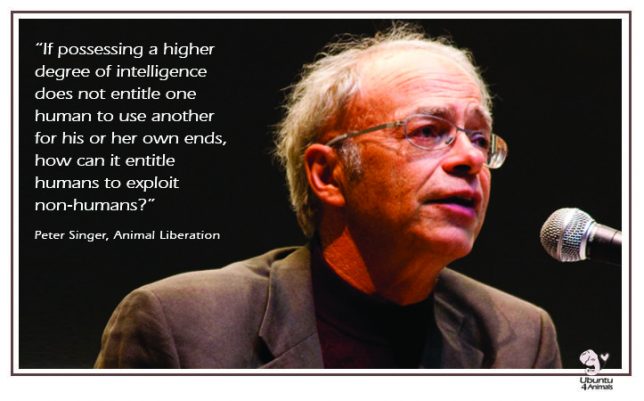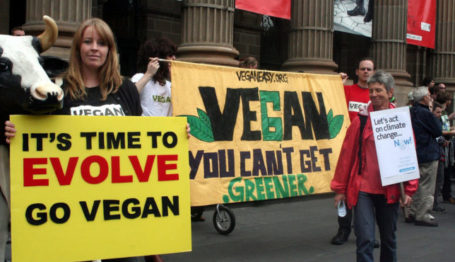Organization Trends
Slaughterhouse Rules: Rights for Animals


Slaughterhouse Rules (Full Series)
Rights for Animals | Disregard for Human Life | Mercy Killings | The Next Generation
Summary: People for the Ethical Treatment of Animals (PETA) claims it’s the “largest animal rights organization in the world.” But scandal after scandal has revealed a disturbing record of hypocrisy that’s left tens of thousands of household pets dead in PETA’s kill rooms. The carnage is the product of a radical ideology that values animals more than humans—and it’s prepared to go to any length to prove it.
Red Veggies
One could make the case that People for the Ethical Treatment of Animals, or PETA, is the punchline of a sick joke: an “animal rights” organization that kills most of the animals it takes into its care while insisting those animals have the human rights that PETA activists would deny to humans.
People for the Ethical Treatment of Animals was founded in 1980 by Ingrid Newkirk, an English-born District of Columbia animal shelter official, and Alex Pacheco, an activist with the radical Sea Shepherd Conservation Society. From the start, the group was a front for militant “animal liberation” activists, a concept still new in the United States but at that time nearly a decade old in Great Britain. PETA gained initial prominence for exposing cruelty at a laboratory in Silver Spring, Maryland, where Newkirk and associates led police officials to raid the premises and charge an employee with 113 counts of cruelty to animals and six counts of failing to provide adequate veterinary care. Their success catapulted PETA and its increasingly bizarre antics to national notoriety.
Bizarre antics would become PETA’s stock-in-trade. Newkirk has covered herself in fake blood and has been arrested some 20 times. She vocally supported the known domestic terrorist group Animal Liberation Front (ALF), even penning a 2011 book on the organization celebrating ALF’s history as an “action-packed story of underground adventure.”
She’s also a notorious misanthrope. “Humans have grown like a cancer,” she told Washingtonian magazine in 1990, “We’re the biggest blight on the face of the Earth.” “I’m not only uninterested in having children,” she told New York magazine in 2003. “I am opposed to having children. Having a purebred human baby is like having a purebred dog; it is nothing but vanity, human vanity.”
Pacheco’s activism is similar. In 1979, he sailed as a deckhand with animal liberation activist Paul Watson on the Sea Shepherd, a vessel Watson’s motley crew used to harass Portuguese whalers in the Atlantic Ocean. Their activism goes beyond educating the public or participating in peaceful protest. The group has been described as “pirates” by a federal court for ramming into other ships and attempting to disable whaling vessels. Pacheco continues to sit on the advisory board of Watson’s activist group, the Sea Shepherd Conservation Society.
Newkirk’s and Pacheco’s is an extreme worldview, but it’s very much in line with that of the animal rights (or animal liberation) movement espoused by PETA. “How do we justify our complete disregard for other animals’ suffering?” asks the narrator of a PETA video which charges humans with “bigotry” toward their “fellow animals.” The video even likens killing animals with the mass extermination of Jews and other victims of the Holocaust. “We do ourselves a huge disservice by only addressing racism and sexism without confronting our speciesism.”
The Slaughterhouse Rules
“Man is the most dangerous, destructive, selfish, and unethical animal on earth.”
Michael W. Fox, vice president of the Humane Society of the United States
The radical animal rights or animal liberation movement, like the radical environmentalist movement with which it occasionally aligns, has its origins in a modest moral proposition: treating animals humanely. European Enlightenment thinkers like Immanuel Kant and Jeremy Bentham were among the first to speculate about animals’ feelings and emotions, arguing against inflicting unnecessary pain on pets and livestock. Jean-Jacques Rousseau, considered by some to be the intellectual father of modern progressive leftism, extended the argument to include animals in his broader definition of natural rights, and even prodded parents to raise their children as vegetarians.
The movement became mainstream with the creation of the Society for the Prevention of Cruelty to Animals in early Victorian Britain by liberal members of Parliament, which pushed for a ban on live dissections. The movement soon spread to the United States, where 19th-century writers such as Upton Sinclair turned the humane treatment of animals into a weapon to criticize slaughterhouse conditions and general American social conventions.
In their 1993 book Animalscam, authors Kathleen Marquardt, Herbert Levine, and Mark Larochelle trace a disturbing pattern of misanthropic rhetoric that reduces humans to mere animals. They show that, by the mid-20th century, the movement to treat animals humanely began mixing the concept of animal rights with Marxist doctrine. As in the case of environmentalism, the politics of class struggle combined with a general contempt for humanity. A 1965 article by the leftist author Brigid Brophy in the British Sunday Times called “the relationship of Homo sapiens to the other animals one of unremitting exploitation.” The website Socialist Worker blamed “the spread of capitalism” for “treat[ing] animals as a means to an end.” And the socialist National Lawyers Guild (created in 1936 as a front for the Communist Party USA) has called for “animal emancipation,” claiming “all sentient members of the animal kingdom are persons.”
But the left-wing, arch-utilitarian philosopher Peter Singer took animal liberation to its inevitable conclusion—the destruction of human rights—when he wrote that “torturing a human being is almost always wrong, but it is not absolutely wrong.” A utilitarian, Singer is blunt about his opinion of Mankind: “Surely there will be some nonhuman animals whose lives, by any standards, are more valuable than the lives of some humans.” (Infamously, Singer has argued in defense of abortion by justifying infanticide.)
Singer earned the status as the “father of animal rights” with his 1975 book Animal Liberation, the manifesto of militant vegetarianism that is inseparable from the broader animal liberation movement. (It is also the book that reportedly inspired Pacheco and Newkirk to found PETA.)
In the next installment of Slaughterhouse Rules, learn how defending animals leads extremists to attempt violence on humans.

